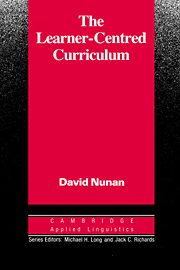Book contents
- Frontmatter
- Contents
- Series Editors' Preface
- Preface
- 1 Introduction
- 2 Curriculum Processes
- 3 Learner-Centred Curriculum Development
- 4 Pre-Course Planning Procedures
- 5 Planning Content
- 6 Methodology
- 7 Resources for a Learner-Centred Curriculum
- 8 Assessment and Evaluation
- 9 Evaluation and Professional Development
- 10 The Teacher as Curriculum Developer
- References
- Appendix
- Subject Index
- Author Index
- Frontmatter
- Contents
- Series Editors' Preface
- Preface
- 1 Introduction
- 2 Curriculum Processes
- 3 Learner-Centred Curriculum Development
- 4 Pre-Course Planning Procedures
- 5 Planning Content
- 6 Methodology
- 7 Resources for a Learner-Centred Curriculum
- 8 Assessment and Evaluation
- 9 Evaluation and Professional Development
- 10 The Teacher as Curriculum Developer
- References
- Appendix
- Subject Index
- Author Index
Summary
This book presents curriculum theory and practice as these are applied to English language teaching. The concept of ‘learner-centredness’ provides a unifying theme for the work as a whole, and, while the focus of the study is adult ESL, it is hoped that the book has something to say to those working in EFL and also to those working with children.
The book takes a ‘bottom-up’ view of curriculum development. In other words, it is grounded in studies of what language teachers actually do and think as they plan, implement and evaluate their language programmes, rather than on what curriculum specialists say they ought to do. A series of exemplary case studies of teachers at work illustrates and reinforces the theoretical perspectives presented in the body of the book.
The book attempts to marry theoretical perspectives and empirical insights from applied linguistics with those from curriculum research and development. It is hoped that the marriage is a happy one, and that the strengths rather than the weaknesses of both disciplines are apparent in the work. It is also hoped that teachers, researchers and academics working within a linguistic paradigm might come to see the benefits to be derived from applying general educational theory and research to language teaching.
This book owes a great deal to the Australian Adult Migrant Education Program (AMEP) which is charged with the task of providing English language learning opportunities to non-English speaking immigrants to Australia. The studies in the book were only made possible by the collaboration, assistance and involvement of many of the fifteen hundred teachers employed by the AMEP.
Information
- Type
- Chapter
- Information
- The Learner-Centred CurriculumA Study in Second Language Teaching, pp. xi - xiiPublisher: Cambridge University PressPrint publication year: 1988
